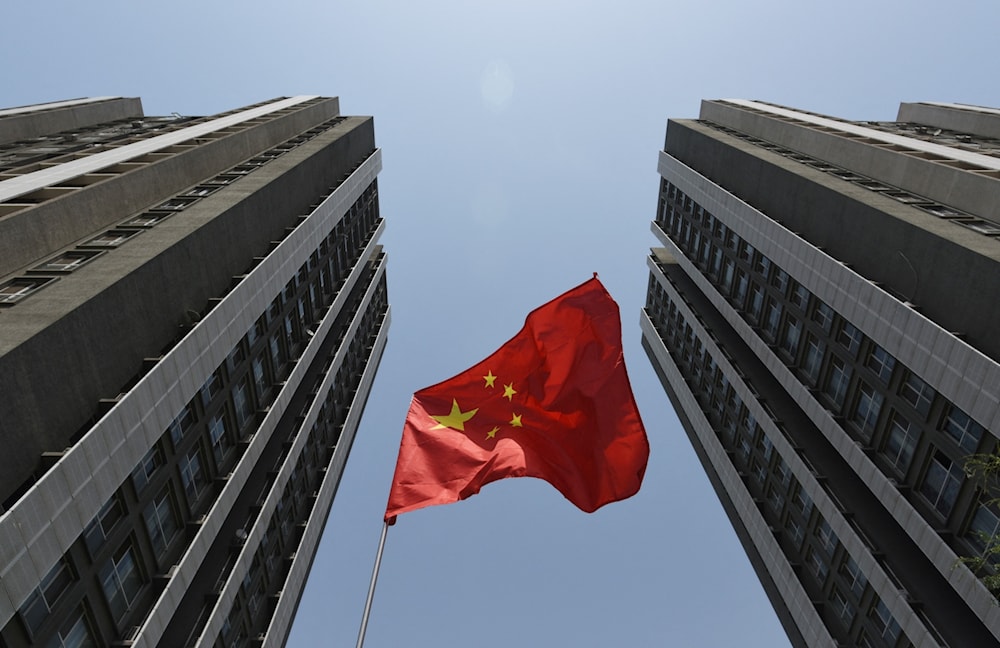China stocks near best week since 2022, oil barrel might exceed $100
The World Bank warns that an escalation in the Middle East might push oil prices beyond $100 a barrel.
-

A Chinese flag flies outside a residential compound in Beijing, China in 2023. (AFP)
Hong Kong and Chinese stocks continued to rise on Friday, with the Hang Seng Index on track for its strongest week in a year and a half.
Investor confidence improved as experts from international investment firms revised their outlook on Chinese stocks.
"A lot of investors do see some technical opportunities in China," said Tai Hui, APAC chief market strategist at J.P. Morgan Asset Management.
Read more: Russia, China ditch dollar; Moscow announces new trade corridors
The ongoing strength of the two stock markets, despite a downturn in the US markets, underscores the significance of incorporating Chinese assets into portfolios for diversification purposes.
In the same vein, BNP Paribas projected that mainland Chinese investors had acquired nearly $20 billion worth of Hong Kong stocks from March to April 23 - marking the most substantial two-month buying spree since 2021.
Tensions in ME could drive oil past $100
The World Bank has stated that a significant escalation of tensions in the Middle East could drive the price of oil beyond $100 per barrel and reverse easing global inflation.
Read more: Blinken to head to China April 24-26 to discuss 'serious concerns'
The organization noted that the recent decline in commodity prices had started to stabilize even prior to the Iranian response to "Israel," complicating interest rate decisions for central banks.
However, it further stated that its prediction of crude oil prices averaging $84 a barrel for this year would likely be overly optimistic should the situation in the Middle East escalate.
Concerns about a major conflict erupting in the Middle East have caused oil prices to increase, resulting in higher fuel expenses. Brent crude oil is currently being sold at $87 per barrel, and the typical cost of a liter of unleaded petrol in the UK has surpassed £1.50, marking the first time since last November.
In its latest commodity market report, the World Bank said, “A moderate conflict-related supply disruption could raise the average Brent price this year to $92 a barrel. A more severe disruption could see oil prices surpass $100 a barrel, raising global inflation in 2024 by nearly one percentage point.”
Read more: Middle East escalations drive up oil prices, influence OPEC+ decisions
Interest rates to remain higher than expected
Markets have already reduced their expectations regarding the extent and speed of interest rate cuts anticipated for this year.
“Global inflation remains undefeated. A key force for disinflation – falling commodity prices – has essentially hit a wall," said Indermit Gill, the World Bank chief economist.
“That means interest rates could remain higher than currently expected this year and next. The world is at a vulnerable moment: a major energy shock could undermine much of the progress in reducing inflation over the past two years.”
Read more: Election year likely to shelve US enforcement of sanctions on Iran
The bank noted that prices of natural gas, food, and fertilizers may also rise in the event of a worsening situation in the Middle East. If a disruption occurred in the Strait of Hormuz, where a significant portion of liquefied natural gas (LNG) exports pass through, prices of fertilizers, which depend on LNG for their production, would increase significantly. This would likely lead to higher food prices.
The Bank's forecast suggests that, if the Middle East crisis remains stable, food prices are expected to decrease by 6% in 2024 and 4% in 2025, while fertilizer prices are projected to decline by 22% in 2024 and 6% in 2025.
Read more: Venezuela oil Co. expands digital currency use amid US oil sanctions

 4 Min Read
4 Min Read








